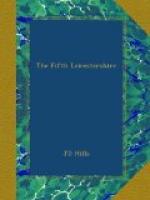We suffered the usual scattered shelling and trench mortaring during the first half of the tour, to which our Artillery could only reply lightly because they were saving ammunition for an organised bombardment further North. However, no serious damage was done, so this did not matter. The bombardment took place at dawn on the 1st September, and in reply the Germans, instead of shelling the left as was expected, concentrated all their efforts on the “50,” “A1” corner, starting with salvoes of whizz-bangs, and finishing with a heavy shoot, 8”, 5.9” and shrapnel, from 10.45 to mid-day. Our Artillery replied at once, but nothing would stop the Boche, who had the most extraordinary good fortune in hitting our dug-outs, causing many casualties. 2nd Lieut. Clay, not yet 24 hours in trenches, was among the first to be wounded, and soon afterwards Serjt. B. Smith, of “B” Company, received a bad wound, to which he succumbed a few hours later. In “A” Company, except for C.S.M. Gorse’s and the Signallers’, every dug-out was hit, and C.E. Scott and F.W. Pringle, the two officers’ batmen, were killed, while A.H. Cassell was badly wounded. The officers themselves had two miraculous escapes. First, 2nd Lieuts. Tomson and Moss were sitting in their dug-out, when a 5.9” dud passed straight through the roof and on into the ground almost grazing 2nd Lieut. Tomson’s side. These two then went round to wake Capt. Hastings, who was resting in another dug-out, and the three had only just left, when this too was blown in, burying Capt. Hastings’ Sam Browne belt and all his papers. Many brave deeds were done during the shelling, two of which stand out. T. Whitbread, of “A” Company, hearing of the burying of the two officers’ servants, rushed to the spot, and, regardless of the shells which were falling all round, started to dig them out, scraping the earth away with his hands, until joined by Sergeants Gore and Baxter, who came up with shovels. The other, whose work cannot be passed over, was our M.O., Captain Barton. Always calm and collected, yet always first on the spot if any were wounded, he seemed to be in his element during a bombardment, and this day was no exception. He was everywhere, tying up wounds, helping the Stretcher Bearers, encouraging everyone he met, and many a soldier owed his life to the ever-present “Doc.”




